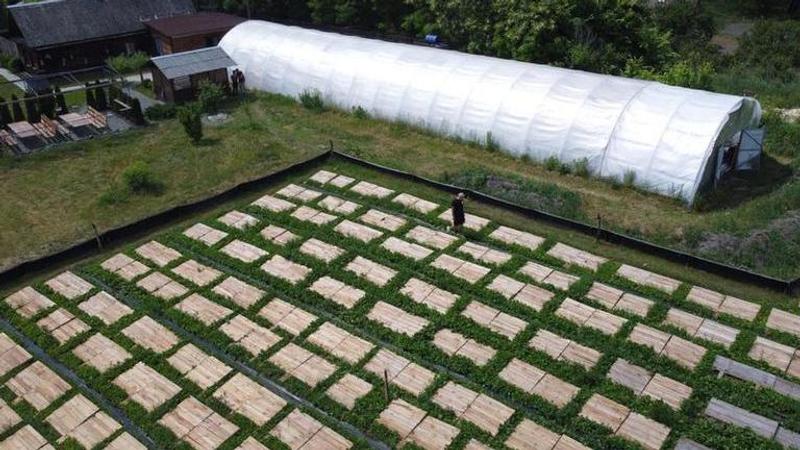Published 08:44 IST, July 10th 2022
Ukraine's grain farmers anxious as harvest begins amid Moscow-Kyiv war
Ukraine's grain farmers anxious as harvest begins

An estimated 22 million tons of grain are blocked in Ukraine, and pressure is growing as the new harvest begins.
The country usually delivers about 30% of its grain to Europe, 30% to North Africa and 40% to Asia.
But with the ongoing Russian naval blockade of Ukrainian Black Sea ports, millions of tons of last year's harvest still can't reach their destinations -- a situation which could lead to disruptions of the world's food supply.
With Russia's blockade of Ukraine's Black Sea ports, nearly all exports via boat have been halted.
"There is no good price for our grains. The storage facilities refuse to receive them. The people have to leave them here. The front line is not far from here. At any time, it can be finished in one moment by bombing or as we see now the fields are on fire," says Yurii Vakulenkv, owner of "Ukrayina" farming enterprise.
Workers risk their lives daily, and sometimes stumble upon military projectiles such as rockets in the field.
Volodymyr Zelenskyy, President of the country known as the "breadbasket of Europe," addressed the problem earlier this week.
"We are interested so that our farmers continue to work for the next year, for the next harvest. For this, we need to export all this grain, barley, wheat, corn, etc. As you know, 22 million tons (of grain) are currently blocked. Today, we talked in detail with the Prime Minister of Sweden (about this). We still expect about 60 million tons (of grain) in the fall; there will be a tough situation," said Zelenskyy.
Meanwhile, many farmers in Ukraine could go bankrupt.
Oleksandr Chubuk's warehouse should be empty, awaiting the new harvest with his supply of winter wheat already shipped abroad.
Instead, his storage bins in central Ukraine are piled high with grain he cannot ship out because of the war with Russia.
Meanwhile the green spikes of wheat are already ripening.
Chubuk expects to reap 500 tons, but for the first time in his 30 years as a farmer, he's uncertain about what to do with it.
"All small, private mills around Kyiv are also stocked up with wheat. The places where the wheat is stored now must be empty, because in two weeks maximum there will be a new harvest," said Chubuk.
The bottleneck of exports is also having an impact on export prices.
Before the invasion, Chubuk could sell a ton of wheat from his Kyiv region farm for $270.
Now he can't find a buyer even at $135 per ton.
Turkish President Recep Tayyip Erdogan has said his country is working with the U.N., Ukraine, and Russia to find a solution, offering safe corridors in the Black Sea for wheat shipments.
For now, Ukraine is trying less-effective alternatives to export its grain, at least to Europe.
Currently, 30% of exports go via three Danube River ports in southwestern Ukraine.
The country is trying to ship grain via 12 border crossings with European countries, but trucks must wait in line for days.
"Our Ukrainian grain cannot enter the international market now because ports are not working. The sea route was the most important. Because of this, the demand for grain decreased. Some new logistics routes through Europe are currently being developed. But Europe cannot handle such big quantities of grain that we produce," said Chubuk.
Before Russia's invasion, Ukraine could export 6 million to 7 million tons of grain per month, but in June it shipped only 2.2 million tons, according to the Ukrainian Grain Association.
"For the moment we face the most difficult situation in past 30 years. I have never seen such a problem which we could not receive (solve) all together. Now in the port we've got stocks of about 5 million tonnes, mostly it's corn, and wheat, and all the stocks are blocked unfortunately, and we cannot stock it the port because ports are blocked by Russians," said Mykola Horbachov, president of the Ukrainian Grain Association.
Russia's invasion also caused transportation costs to soar.
The price to deliver this year's harvested barley to the closest Romanian port, Constanta, is now $160 to $180 per ton, up from $40 to $45.
And yet a farmer selling barley to a trader gets less than $100 per ton.
"(I) hope we will find solution how we open the ports, because without opening port I don't think the Ukrainian farmers will survive. And if Ukrainian farmers will not survive, we will not be able to feed African countries," he added
The U.N. Food and Agriculture Organization says the war is endangering food supplies for many developing nations and could worsen hunger for up to 181 million people.
"We can decrease our production, for example Ukraine in the past season grew 107 million tone grain and oil seeds and our domestic consumption is less than 30 million. It's when we could export 70 million tons, but we did only 53 and mostly we did this before the Russian invasion, because after the invasion we exported just 5 million tons during past five months," said Horbachov.
The country hasn't yet run out of storage as the harvest begins.
Ukraine has about 65 million to 67 million tons of commercial grain storage capacity, according to Horbachov, although 20% of that is in Russian-occupied territories.
Farmers themselves can store 20 million to 25 million tons, but some of that is also in occupied areas.
By the end of September, when the harvest of corn and sunflower seeds begins, Ukraine will face a shortage of storage capacity.
The FAO recently announced a $17 million project to help address the storage deficit. Heneghan of Gro Intelligence noted that one temporary solution could be providing farmers with silo bags for storage.
Updated 08:45 IST, July 10th 2022




